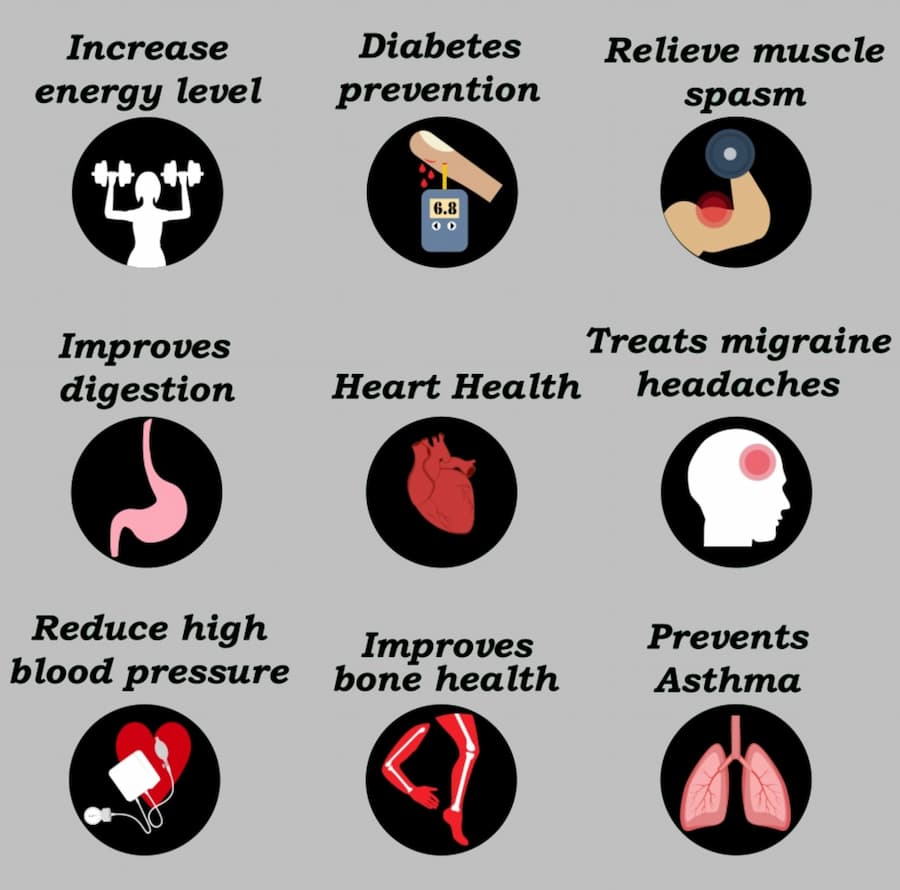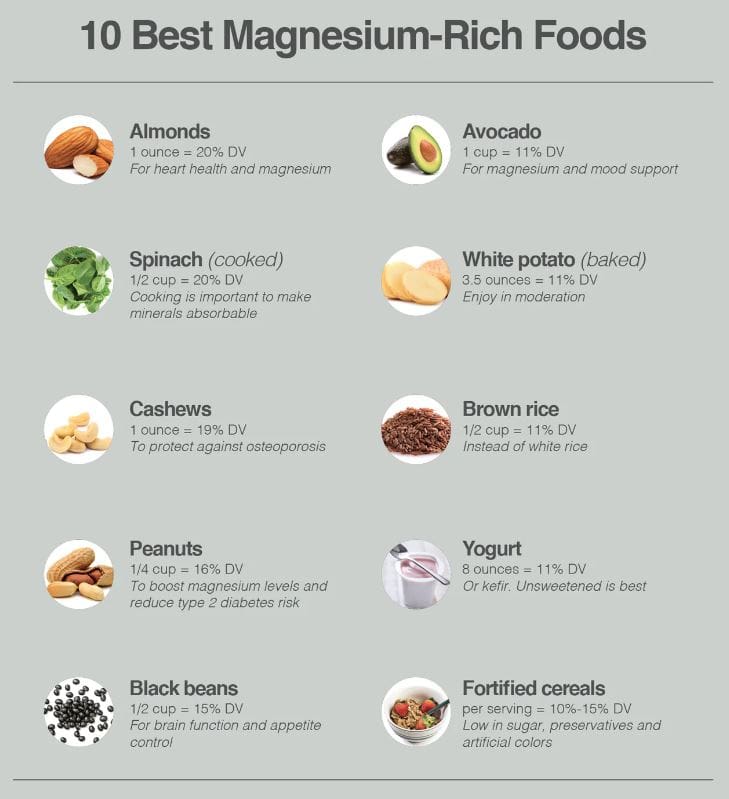Table of Contents
Introduction
Nowadays, many individuals are incorporating various fruits, vegetables, lean portions of meat, and healthy fats and oils into their diet to get all the vitamins and minerals that their bodies need. The body needs these nutrients biotransformed into energy for the muscles, joints, and vital organs. When normal factors like eating unhealthy foods, not getting enough exercise, and underlying conditions affect the body, it can cause somato-visceral issues that correlate with disorders that push many individuals to feel unwell and miserable. Luckily, some supplements and vitamins like magnesium help with overall health and can reduce the effects of these environmental factors that are causing pain-like symptoms in the body. In this 3-part series, we will look at the impact of magnesium helping the body and what foods contain magnesium. Part 1 looks at how magnesium correlates with heart health. Part 2 looks at how magnesium helps with blood pressure. We refer our patients to certified medical providers that provide many available therapy treatments for individuals suffering from underlying conditions associated with low magnesium levels affecting the body and correlated to many underlying conditions affecting a person’s health and wellness. We encourage each patient when it is appropriate by referring them to associated medical providers based on their diagnosis. We accept that education is a marvelous way when asking our providers’ hard-hitting questions at the patient’s request and acknowledgment. Dr. Jimenez, D.C., only utilizes this information as an educational service. Disclaimer
An Overview Of Magnesium

Have you been experiencing muscle numbness in different locations in your body? What about muscle cramps or fatigue? Or have you been experiencing issues with your heart? Suppose you have been dealing with these overlapping issues that are affecting not only your body but your overall health. In that case, it could correlate with your body’s low magnesium levels. Studies reveal that this essential supplement is the body’s fourth most abundant cation when it comes to magnesium since it is a co-factor for multiple enzymic reactions. Magnesium helps with cellular energy metabolism, so the muscles and vital organs can function properly and helps replenish intracellular and extracellular water intake. Magnesium helps with the body’s metabolism, but it can also help reduce the effects of chronic conditions affecting the body.
How Magnesium Helps The Body

Additional studies reveal that magnesium is important in lowering chronic conditions’ effects on the body. Magnesium could help many individuals dealing with cardiovascular issues or chronic diseases associated with the heart or the muscles surrounding the upper and lower extremities of the body. How can magnesium help with overlapping health disorders that can affect the body? Studies show that taking magnesium can help prevent and treat many common health conditions:
- Metabolic syndrome
- Diabetes
- Headaches
- Cardiac arrhythmias
Many of these conditions are associated with everyday factors that can affect the body and lead to chronic disorders that can cause pain to the muscles, joints, and vital organs. So, taking magnesium can reduce pre-existing conditions from elevating the body and causing more harm.
Magnesium In Food

Biomedical physiologist Alex Jimenez mentions that magnesium supplementation usually causes diarrhea and explains what foods are high in magnesium. Surprisingly, avocados and nuts have a chaulk full of magnesium. One medium avocado has about 60 milligrams of magnesium, while nuts, especially cashews, have approximately 83 milligrams of magnesium. One cup of almonds has about 383 milligrams of magnesium. It also has 1000 milligrams of potassium, which we covered in an earlier video, and around 30 grams of protein. So this is a good snack to break up the cup into about half-cup serving throughout the day and snack on as you’re going. The second one is beans or legumes; for example, one cup of black beans cooked has around 120 milligrams of magnesium. And then wild rice is also a good source of magnesium. So what are the signs of low magnesium? The symptoms of low magnesium are muscle spasms, lethargy, irregular heartbeat, pins and needles in the hands or legs, high blood pressure, and depression. This video was informative for you regarding magnesium, where to find it, and the best supplemental forms to take it in. Thank you again, and tune in next time.
Foods Containing Magnesium
When it comes to taking magnesium, there are many ways to incorporate magnesium into the body’s system. Some people take it in supplemental form, while others eat healthy, nutritious foods with a chaulk full of magnesium to get the recommended amount. Some of the foods that are riched in magnesium include:
- Dark Chocolate=65 mg of magnesium
- Avocados=58 mg of magnesium
- Legumes=120 mg of magnesium
- Tofu= 35 mg of magnesium
What is great about getting these magnesium riched foods is that they can be in any dishes we consume for breakfast, lunch, and dinner. Incorporating magnesium in a healthy diet can help boost the body’s energy levels and help support the major organs, joints, and muscles from various disorders.
Conclusion
Magnesium is an essential supplement that the body needs to boost energy levels and help reduce the effects of pain-like symptoms that can cause dysfunction in the body. Whether it is in supplemental form or eating it in healthy dishes, magnesium is an important supplement that the body needs to function properly.
References
Fiorentini, Diana, et al. “Magnesium: Biochemistry, Nutrition, Detection, and Social Impact of Diseases Linked to Its Deficiency.” Nutrients, U.S. National Library of Medicine, 30 Mar. 2021, https://www.ncbi.nlm.nih.gov/pmc/articles/PMC8065437/.
Schwalfenberg, Gerry K, and Stephen J Genuis. “The Importance of Magnesium in Clinical Healthcare.” Scientifica, U.S. National Library of Medicine, 2017, https://www.ncbi.nlm.nih.gov/pmc/articles/PMC5637834/.
Vormann, Jürgen. “Magnesium: Nutrition and Homoeostasis.” AIMS Public Health, U.S. National Library of Medicine, 23 May 2016, https://www.ncbi.nlm.nih.gov/pmc/articles/PMC5690358/.
Disclaimer
Post Disclaimer
Professional Scope of Practice *
The information herein on "Why Magnesium Is Important For Your Health? (Part 3)" is not intended to replace a one-on-one relationship with a qualified health care professional or licensed physician and is not medical advice. We encourage you to make healthcare decisions based on your research and partnership with a qualified healthcare professional.
Blog Information & Scope Discussions
Welcome to El Paso's Premier Wellness, Personal Injury Care Clinic & Wellness Blog, where Dr. Alex Jimenez, DC, FNP-C, a Multi-State board-certified Family Practice Nurse Practitioner (FNP-BC) and Chiropractor (DC), presents insights on how our multidisciplinary team is dedicated to holistic healing and personalized care. Our practice aligns with evidence-based treatment protocols inspired by integrative medicine principles, similar to those on this site and our family practice-based chiromed.com site, and focuses on restoring health naturally for patients of all ages.
Our areas of multidisciplinary practice include Wellness & Nutrition, Chronic Pain, Personal Injury, Auto Accident Care, Work Injuries, Back Injury, Low Back Pain, Neck Pain, Migraine Headaches, Sports Injuries, Severe Sciatica, Scoliosis, Complex Herniated Discs, Fibromyalgia, Chronic Pain, Complex Injuries, Stress Management, Functional Medicine Treatments, and in-scope care protocols.
Our information scope is multidisciplinary, focusing on musculoskeletal and physical medicine, wellness, contributing etiological viscerosomatic disturbances within clinical presentations, associated somato-visceral reflex clinical dynamics, subluxation complexes, sensitive health issues, and functional medicine articles, topics, and discussions.
We provide and present clinical collaboration with specialists from various disciplines. Each specialist is governed by their professional scope of practice and their jurisdiction of licensure. We use functional health & wellness protocols to treat and support care for musculoskeletal injuries or disorders.
Our videos, posts, topics, and insights address clinical matters and issues that are directly or indirectly related to our clinical scope of practice.
Our office has made a reasonable effort to provide supportive citations and has identified relevant research studies that support our posts. We provide copies of supporting research studies upon request to regulatory boards and the public.
We understand that we cover matters that require an additional explanation of how they may assist in a particular care plan or treatment protocol; therefore, to discuss the subject matter above further, please feel free to ask Dr. Alex Jimenez, DC, APRN, FNP-BC, or contact us at 915-850-0900.
We are here to help you and your family.
Blessings
Dr. Alex Jimenez DC, MSACP, APRN, FNP-BC*, CCST, IFMCP, CFMP, ATN
email: [email protected]
Multidisciplinary Licensing & Board Certifications:
Licensed as a Doctor of Chiropractic (DC) in Texas & New Mexico*
Texas DC License #: TX5807, Verified: TX5807
New Mexico DC License #: NM-DC2182, Verified: NM-DC2182
Multi-State Advanced Practice Registered Nurse (APRN*) in Texas & Multi-States
Multi-state Compact APRN License by Endorsement (42 States)
Texas APRN License #: 1191402, Verified: 1191402 *
Florida APRN License #: 11043890, Verified: APRN11043890 *
Colorado License #: C-APN.0105610-C-NP, Verified: C-APN.0105610-C-NP
New York License #: N25929, Verified N25929
License Verification Link: Nursys License Verifier
* Prescriptive Authority Authorized
ANCC FNP-BC: Board Certified Nurse Practitioner*
Compact Status: Multi-State License: Authorized to Practice in 40 States*
Graduate with Honors: ICHS: MSN-FNP (Family Nurse Practitioner Program)
Degree Granted. Master's in Family Practice MSN Diploma (Cum Laude)
Dr. Alex Jimenez, DC, APRN, FNP-BC*, CFMP, IFMCP, ATN, CCST
My Digital Business Card
Licenses and Board Certifications:
DC: Doctor of Chiropractic
APRNP: Advanced Practice Registered Nurse
FNP-BC: Family Practice Specialization (Multi-State Board Certified)
RN: Registered Nurse (Multi-State Compact License)
CFMP: Certified Functional Medicine Provider
MSN-FNP: Master of Science in Family Practice Medicine
MSACP: Master of Science in Advanced Clinical Practice
IFMCP: Institute of Functional Medicine
CCST: Certified Chiropractic Spinal Trauma
ATN: Advanced Translational Neutrogenomics
Memberships & Associations:
TCA: Texas Chiropractic Association: Member ID: 104311
AANP: American Association of Nurse Practitioners: Member ID: 2198960
ANA: American Nurse Association: Member ID: 06458222 (District TX01)
TNA: Texas Nurse Association: Member ID: 06458222
NPI: 1205907805
| Primary Taxonomy | Selected Taxonomy | State | License Number |
|---|---|---|---|
| No | 111N00000X - Chiropractor | NM | DC2182 |
| Yes | 111N00000X - Chiropractor | TX | DC5807 |
| Yes | 363LF0000X - Nurse Practitioner - Family | TX | 1191402 |
| Yes | 363LF0000X - Nurse Practitioner - Family | FL | 11043890 |
| Yes | 363LF0000X - Nurse Practitioner - Family | CO | C-APN.0105610-C-NP |
| Yes | 363LF0000X - Nurse Practitioner - Family | NY | N25929 |
Dr. Alex Jimenez, DC, APRN, FNP-BC*, CFMP, IFMCP, ATN, CCST
My Digital Business Card





 Again, We Welcome You.
Again, We Welcome You.
Comments are closed.